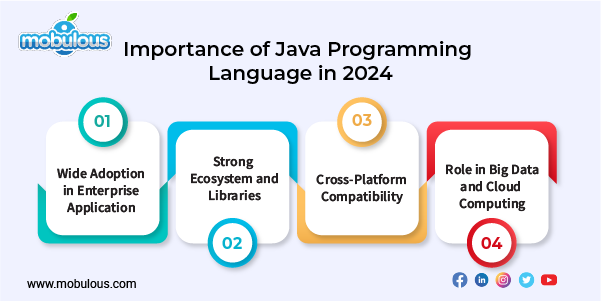The importance of Java programming language remains in its scalability, versatility, and widespread adoption across various industries. Java empowers business applications, mobile apps, website development, and emerging technologies such as AI and IoT.
Java is one of the most established and top programming languages that continues to hold significant importance of Java language in the technologically advanced landscape of 2024. Due to its popularity, Java has become a pillar of modern software development.
As we navigate today’s technological landscape, understanding the importance of Java programming language becomes essential as it offers insights into its enduring relevance and the opportunities it presents for developers and businesses alike.
What is Java?
Java is a versatile and popularly-used programming language that is known for its reliability, portability, and scalability. It was developed by Sun Microsystems (now owned by Oracle) in 1995. It follows a principle called “write once, run anywhere.”
This principle enables programs to run on different platforms without any re-compilation. Java is an object-oriented language (OOP) that strongly emphasizes security, simplicity, and performance. Java is mostly used in web development (especially on the backend), enterprise applications, mobile app development (Android), cloud computing, and big data processing.
There is immense importance of Java programming language and it has a rich ecosystem of libraries and frameworks that makes Java one of the most popular programming languages for building scalable and robust software solutions across various domains.
History of Java Programming Language
Java was developed by Sun Microsystems in 1995 with an aim to address the challenges of platform dependency in software development. It was designed by James Gosling and his team as a versatile OOP (Object-Oriented Programming) language that is capable of running on any device with a Java Virtual Machine (JVM).
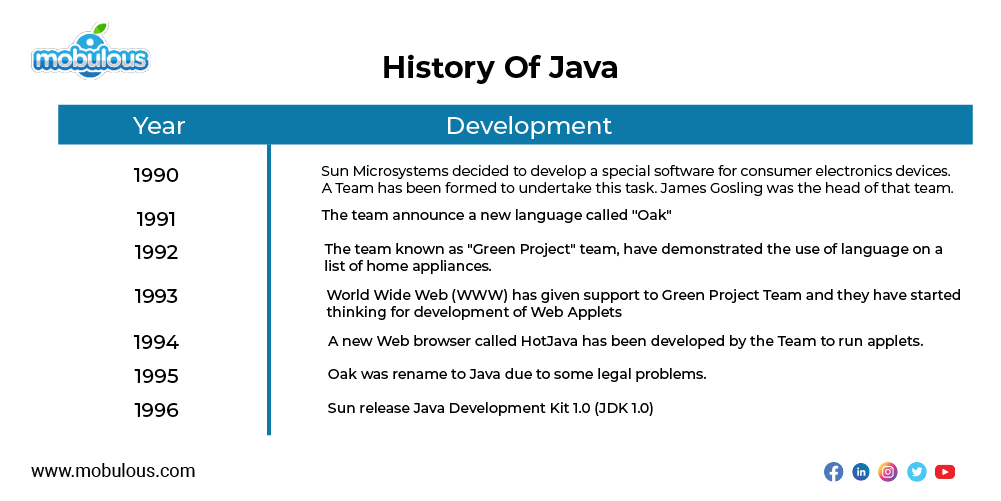
Java language quickly gained popularity for its versatility, portability, and security features that offer a consistent environment across various platforms. Its introduction of applets revolutionized website development.
Java’s acquisition by Oracle in 2010 further strengthened its future, ensuring continuous upgrades, support, and new enhanced features for the vast community of Java developers on a global scale.
Importance of Java Programming Language in 2024
Java is a crucial programming language that is known for its versatility and global adoption rate in web development, enterprise applications, mobile app development, etc. In short, this language plays a crucial role in the technological landscape of 2024 due to several key factors explained below.
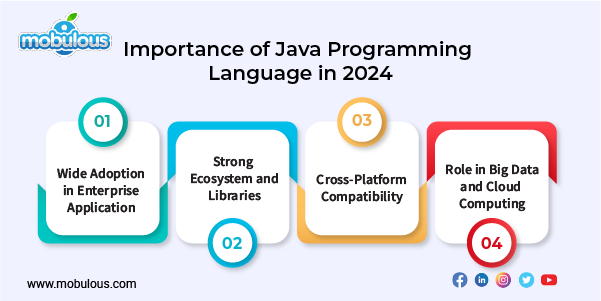
Wide Adoption in Enterprise Applications
Extensive adoption of Java in enterprise applications stems from its scalability, stability, and maturity. Several large organizations depend on Java in order to build mission-critical systems and business applications.
The robustness and importance of Java programming language ensure that enterprise applications are able to handle big volumes of transactions and data reliably.
Additionally, the compatibility of Java with the most popular frameworks like Hibernate and Spring fosters quick development and deployment of enterprise solutions.
Strong Ecosystem and Libraries
Java boasts a rich ecosystem of frameworks, tools, and libraries that improve the productivity of developers and enable the creation of complex applications with advanced features. Essential frameworks like Spring Boot provide extensive solutions for creating web applications and microservices.
The vast standard library of Java programming language offers APIs for concurrency, database access, networking, etc in order to reduce the requirement for developers to re-invent the wheel.
Cross-Platform Compatibility
The principle of Java, i.e., “write once, run anywhere” contributes to the importance of Java programming language as it remains a significant advantage in the 21st century.
Various applications created with Java are able to run effortlessly on various platforms such as macOS, Windows, Linux, and several mobile devices.
The cross-platform compatibility is achieved via Java Virtual Machine (JVM), which abstracts hardware-specific details. This makes Java applications high-performing and highly portable.
Role in Big Data and Cloud Computing
Java is the best programming language that plays an essential role in the field of big data and cloud computing. In big data analytics, Java-based technologies like Apache Spark and Apache Hadoop are used extensively for the distributed processing of large datasets.
These important frameworks leverage the concurrency and scalability features of Java in order to handle and manage comprehensive data volumes effectively. This contributes to the importance of Java programming language in today’s competitive landscape.
Additionally, Java is perfectly suited for cloud-native development. Several cloud platforms and services like Microsoft Azure and Amazon Web Services (AWS) support Java applications.
The compatibility of Java programming language with cloud technologies and frameworks enables developers to create and launch resilient, scalable, and cloud-native applications seamlessly and hassle-free.
Also Read:- Seek Assistance from Cloud Hosting Services Company!
Java in Web Development
Frameworks like Spring Boot has facilitated Java-based web development that offers tools for creating scalable and responsive web applications. Java is extensively used in the backend development that handles and manages complex business logic effectively.
Below is an example of a RESTful web service implemented with the help of Spring Boot.
import org.springframework.boot.SpringApplication;
import org.springframework.boot.autoconfigure.SpringBootApplication;
import org.springframework.web.bind.annotation.GetMapping;
import org.springframework.web.bind.annotation.RestController;
@SpringBootApplication
public class WebApplication {
public static void main(String[] args) {
SpringApplication.run(WebApplication.class, args);
}
}
@RestController
class HelloController {
@GetMapping(“/hello”)
public String sayHello() {
return “Hello from Spring Boot!”;
}
}
In this example, you can see that Spring Boot is handling the setup of a RESTful endpoint ‘/hello’ that returns a simple greeting message. The maturity, performance, and vast ecosystem of Java make it an appealing choice for developers for backend web development.
Java in Mobile App Development
Java is essential in mobile app development specifically for Android app development. Android applications are generally built with the help of Java or Kotlin. Let’s have a glimpse of a basic Android activity written in Java.
import android.app.Activity;
import android.os.Bundle;
import android.widget.TextView;
public class MainActivity extends Activity {
@Override
protected void onCreate(Bundle savedInstanceState) {
super.onCreate(savedInstanceState);
TextView textView = new TextView(this);
textView.setText(“Hello, Android!”);
setContentView(textView);
}
}
In this example, you can see the ‘MainActivity’ class sets up a simple Android activity that showcases a text view with the message “Hello, Android!.” The familiarity, comprehensive libraries, and performance of Java programming language make it one of the best choices for Android developers to build high-performing Android apps.
Java in the Internet of Things (IoT)
The suitability of Java for IoT (Internet of Things) development stems from its platform independence, performance characteristics, and potent ecosystem. The lightweight runtime and scalability of Java programming language make it perfectly suited for IoT devices, which mostly have limited resources. Let’s understand this with an example of using Java for IoT.
import java.util.concurrent.Executors;
import java.util.concurrent.ScheduledExecutorService;
import java.util.concurrent.TimeUnit;
public class IoTDevice {
public static void main(String[] args) {
ScheduledExecutorService executor = Executors.newScheduledThreadPool(1);
// Schedule a task to run every 5 seconds
executor.scheduleAtFixedRate(() -> {
// Code to read sensor data and perform IoT operations
System.out.println(“Reading sensor data…”);
// Example IoT operation
System.out.println(“Sending data to cloud…”);
}, 0, 5, TimeUnit.SECONDS);
}
}
In this example, a Java program simulates an IoT device that reads sensor data periodically and performs IoT operations such as sending data to the cloud. The concurrency feature of Java and its compatibility with different IoT protocols and platforms make it the best choice for building IoT applications and handling connected devices effectively.
Java in Machine Learning and AI
The role of Java in Artificial Intelligence and Machine Learning, i.e., AI/ML has been evolving, although it is not as dominant as languages like Python. Java offers libraries and frameworks that support AI/ML applications. Hence, Java is popularly considered as the best programming language for AI.
Let’s see a simplified example with the help of Deeplearning4j which is a popular Java library for deep learning.
import org.deeplearning4j.nn.multilayer.MultiLayerNetwork;
import org.deeplearning4j.datasets.iterator.impl.MnistDataSetIterator;
import org.nd4j.linalg.dataset.api.iterator.DataSetIterator;
import org.nd4j.linalg.dataset.DataSet;
public class JavaMLAIExample {
public static void main(String[] args) throws Exception {
// Create a dataset iterator (MNIST dataset in this case)
DataSetIterator mnistIterator = new MnistDataSetIterator(32, true, 12345);
// Define a neural network model (multi-layer perceptron)
MultiLayerNetwork model = new MultiLayerNetwork(/* specify network configuration */);
model.init();
// Train the model with the dataset
while (mnistIterator.hasNext()) {
DataSet dataSet = mnistIterator.next();
model.fit(dataSet);
}
// Perform predictions with the trained model
// Example inference code
// double[] input = /* input data */;
// INDArray output = model.output(Nd4j.create(input));
// System.out.println(“Predicted output: ” + output);
}
}
In this example, we leverage Deeplearning4j in order to create a neural network model and train it with the help of the MNIST dataset. The strengths of Java in scalability, performance, and enterprise integration make it suitable for certain AI/ML applications, specifically in scenarios where Java is already prevalent or when there is a need for JVM compatibility.
Uses of Java Programming Language
The importance of Java programming language can never be overstated. It is secure, versatile, and developed for distributed operation, which generally means that devices can run the same program and tap into each other for information and resources.
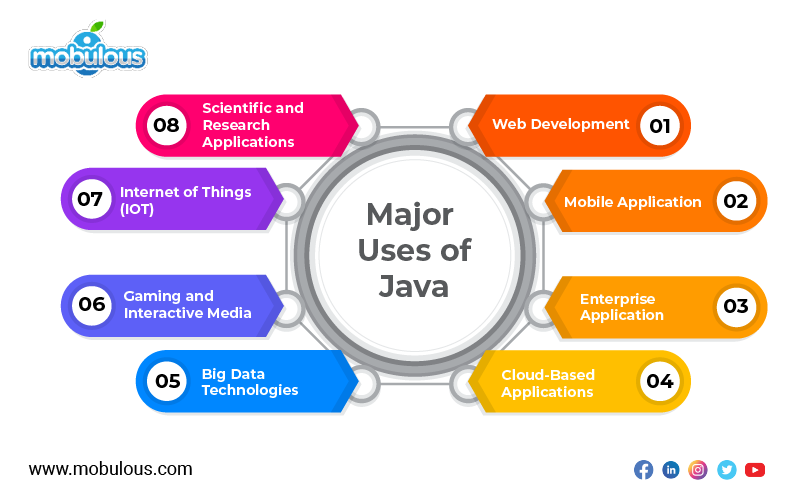
- Web Development: Java language is used on the server side for developing dynamic web apps. Frameworks like JavaServer Pages (JSP) foster scalable and secure web development.
- Mobile Applications: Java is one of the top programming languages for Android app development. Java-based Android SDK and Android Studio IDE enable developers to create feature-rich mobile apps.
- Enterprise Applications: Java is the best language for building enterprise-level apps like ERP, CRM, and banking systems. The scalability, robustness, and comprehensive libraries of Java make it one of the best choices for large-scale business applications.
- Cloud-Based Applications: Java is prominently used in cloud computing in order to develop resilient and scalable apps. Some technologies like Jakarta EE and Spring Cloud provide tools for building cloud-native applications.
- Big Data Technologies: Java is integral to big data processing frameworks such as Apache Spark and Apache Hadoop. The performance potential and concurrency of Java handle and manage enormous datasets effectively.
- Gaming and Interactive Media: Java is used in game development with engines like JavaFX and libraries like LibGDX. The graphical potential and cross-platform support make it suitable for interactive media applications.
- Internet of Things (IoT): The platform independence and lightweight runtime of Java make it suitable for IoT devices. Java ME or Micro Edition is leveraged for building embedded systems and IoT applications.
- Scientific and Research Applications: Java is utilized in research and scientific computing because of numerical and mathematical libraries. Java’s stability and performance meet the demands of data analysis and computational simulations.
Challenges and Overcomes in Java Programming Language
Despite the widespread adoption, potency, and importance of Java programming language, it still faces several challenges in the rapidly advancing landscape of software development. However, the community of Java consistently innovates and addresses these challenges via different strategies and technologies.
Challenges in Java Programming
Java faces serious competition from newer programming languages, performance overhead because of the JVM, complexity in the enterprise application development, security vulnerabilities, and adaption to modern tech paradigms such as microservices and cloud-native architectures. Let’s understand them in a bit more detail.
- Competition from Newer Languages: Java language faces competition from newer languages such as Rust, Kotlin, and Swift as they offer modern features and more concise syntax.
- Performance Overhead: The Java Virtual Machine, i.e., JVM is able to introduce performance overhead because of bytecode interpretation and memory management. This can be mitigated with optimizations such as Just-In-Time (JIT) compilation.
- Complexity in Enterprise Development: Enterprise Java development can be complicated because of the sheer number of frameworks, tools, and libraries available. This complexity can result in a longer development cycle and escalated maintenance efforts.
- Security Vulnerabilities: Java applications can be vulnerable to security exploits, especially if not updated regularly in order to address and handle known vulnerabilities in dependencies and libraries.
- Adaption to Modern Tech: Java needs to adapt to contemporary development paradigms such as serverless computing, microservices, and cloud-native architectures.
Overcoming Challenges in Java Programming
The Java language addresses challenges with modern features like modularization and records, optimizations in JVM performance, simplifying enterprise development with frameworks like Spring Boot, regular security updates, and seamless integration with modern architectures.
- Introduction of Modern Features: Java programming language has been evolving with the introduction of new features like modularization (Java 9+), records (Java 14+), and pattern matching (Java 16+) in order to stay competitive with newer languages.
- Optimizations and Performance Improvements: The Java ecosystem consistently enhances performance with improvements to the JVM, bytecode optimizations, and garbage collection algorithms.
- Simplification and Standardization: Efforts like Project Loom strive to simplify concurrent programming in Java, reducing the complexity associated with enterprise application development.
- Enhanced Security Practices: Regular updates and security patches assist in mitigating security vulnerabilities. Additionally, Java developers adopt safe and secure coding practices and leverage security frameworks and tools.
- Integration with Modern Tech: Java frameworks such as Quarkus and Spring Boot foster seamless integration with contemporary development practices.
Future of Java Programming Language 2024 and Beyond
Despite the technological landscape, the history of Java programming language remains promising. As per recent surveys, Java continues to be among one of the best languages for enterprise development, with a necessary developer base.
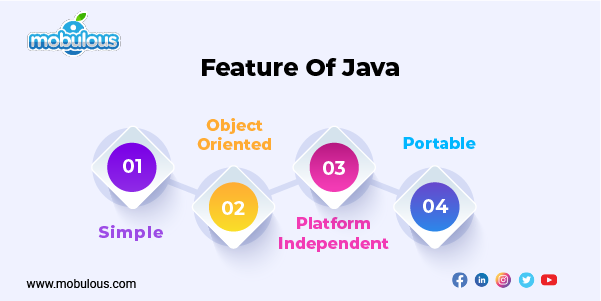
As we know Java language is facing competition from newer languages, its adaptability and maturity make it resilient. In addition to this, Java’s evolution with certain features like Project Valhalla (value types) and Project Panama (native interop) improves its performance and versatility.
With the emphatic presence of Java in IoT and cloud-native development, its future seems secure, supported by a potent ecosystem and community-driven innovations.
Statistics About Java Programming Language
In order to understand better the importance of Java programming language, it is important to look at some of the crucial key facts and statistics. Let’s understand them perfectly.
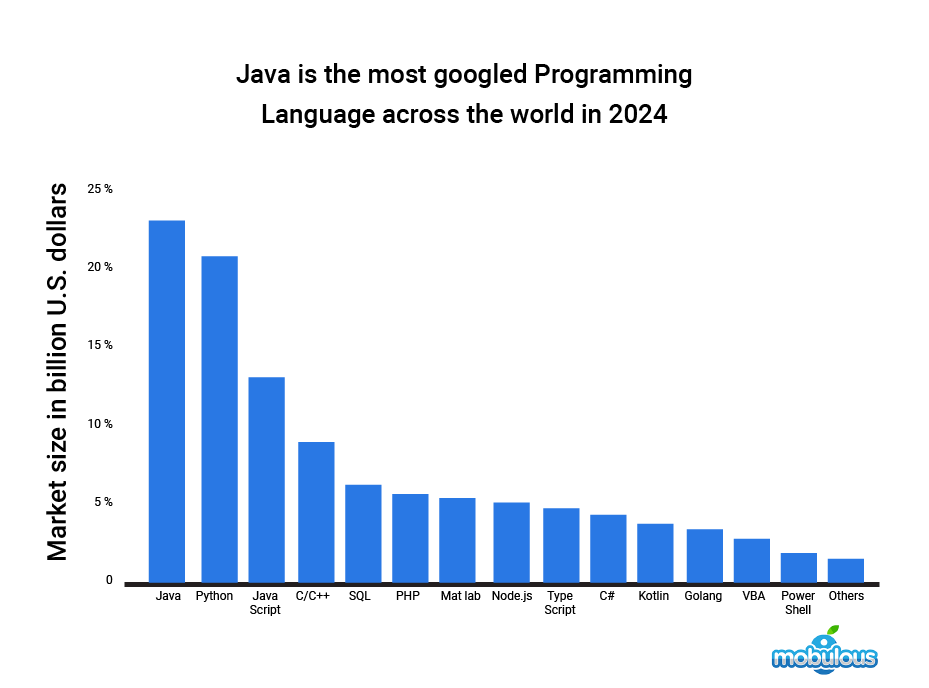
- More than 97% of corporations leverage Java as their main programming language.
- Around 97.85% of businesses’ PCs run Java language.
- Almost 90% of computers in the United States leverage Java.
- Over 3 billion mobile phones run Java since Google’s Android operating system leverages Java APIs.
- There are more than 10 million Java developers on a global scale.
- Java programming language is considered one of the best options for developers globally.
- Java is a highly used development platform.
- There are currently 5 Billion+ Java Cards in service.
- More than 127 million television appliances run Java programming language.
The Bottom Line
Java remains the foundation of contemporary software development, powering crucial applications in web, mobile, enterprise, and evolving technologies. Despite facing several challenges and competition from new programming languages, the adaptability, comprehensive ecosystem, and robustness of Java ensure its consistent relevance.
As industries evolve towards big data analytics, AI, IoT, and cloud computing, the scalability and versatility of Java consider it the top programming language for developing ingenious and impactful software solutions in the long run. Hence, we can say that there is an extensive importance of Java programming language.
FAQs — Importance of Java Programming Language
Q. What is Java used for in 2024?
Ans. Because of the data framework, Java language can be used to develop AI applications. It acts as an add-on to the AI ecosystem by building applications that are independent and portable. Java language contains different libraries and tools that act as tools to build AI-incorporated technology.
Q. Is it worth learning Java in 2024?
Ans. Yes, of course, Java is worth learning and there are several importance of learning Java as it is in high demand in 2024 and beyond due to its cross-platform compatibility, platform independence, huge adaptation, and robust community support to contemporary software development like big data, IoT, cloud computing, AI, and mobile app development.
Q. Is Java useful in the future?
Ans. The future of Java looks promising as it enjoys widespread adoption across different industries such as retail, healthcare, and financial services. Additionally, evolving technologies such as AI and IoT are leveraging Java as the foundational language.
Q. What is the importance of Java programming language?
Ans. Java is important for its robustness, platform independence, and widespread usage in enterprise systems, web applications, and mobile apps. Its security, simplicity, and large ecosystem. It runs on the principle “Write once run anywhere” which is the main reason why it has gained popularity among developers and app development companies.
Q. Should I learn Python or Java in 2024?
Ans. Python is usually suggested for beginner developers because of its simplicity, whereas Java is the best choice for experienced developers who are interested in mobile application development. However, the choice generally depends on the developer’s career goals and interests.
Q. Is JavaScript important to learn?
Ans. If you want to become a developer for web development or Android development, then it is important for you to learn this language and you should genuinely start with plain old vanilla JavaScript first.























